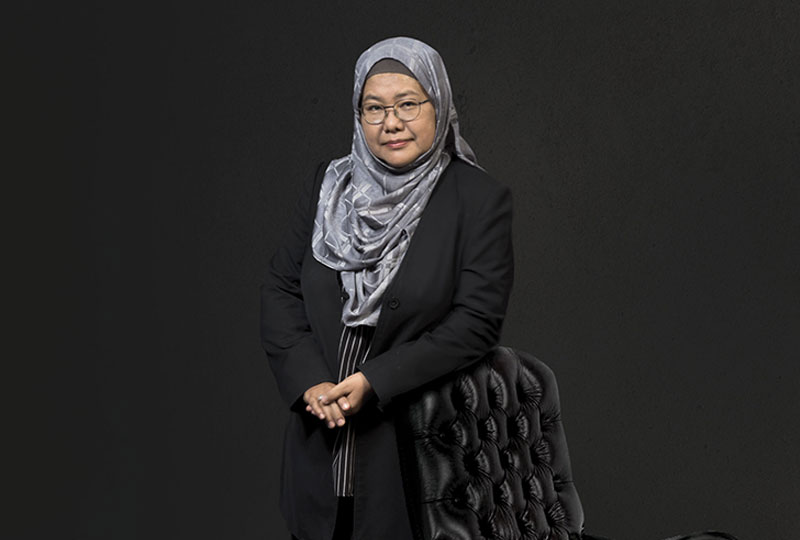Conceiving “Learner Experience”
“Learner experience” can be described as the experience learners undergo in their quest for an academic qualification. This encompasses the various points of interactions between the learners and the learning provider which in this context is Open University Malaysia (OUM).
A typical interaction starts with the prospective student learning about OUM through social media, perusing OUM programme advertisements in the print or digital form, or interacting with our marketing staff in person at the main campus or at any of our 33 learning centres spread across the country
Prospective students who eventually decide to enrol with OUM (or any other learning provider for that matter) invariably do so with certain expectations of what that decision should entail. Crossing the threshold, newly enrolled learners will bring these expectations with them, modulating them as they engage with the university over time, and measuring the actual lived experience against their conceived ideals.
Any university that prioritises the formation of positive learner experience will strive to ensure that it meets, or better yet, exceeds, learner expectations from the moment the learners join the university until they graduate and exit the system. OUM, for one, is committed to this priority which is literally inscribed in its mission statement: “To widen access to quality education and provide lifelong learning opportunities by leveraging on technology, adopting flexible mode of learning, and providing a conducive and engaging learning environment at competitive and affordable cost.”
Having this commitment to delivering positive learner experience built into OUM’s institutional culture is enormously useful in this post-marketing age where people have all but become fatigued by a surfeit of gimmicky marketing campaigns and promises, preferring instead to evaluate things based on their direct experience with the service provider, as well as the experience of friends and other people who share in social media. Providentially, this prior commitment to learner experience brings OUM closer in alignment with the philosophy of customer-first service championed by entrepreneurs like Derek Sivers (founder of CD Baby) and Jeff Bezos (founder of Amazon). At the least, it puts the University in good stead to address learner grievances as they arise.
Learner Feedback and Institutional Improvement
In a typical semester, OUM learners will interact with the University with a certain regularity, such as attending study skills workshops, registering for courses, paying course fees, attending tutorials, accessing course e-contents, interacting with their peers and e-tutors in the e-forums, and sitting for examinations. The main points of contact for OUM learners are the University’s tutors and facilitators, as well as the administrative staff of the learning centres across the nation. Expectedly, then, these serve as the lightning rod of learner feedback.
Much of the learner feedback received by the University are channelled through its Electronic Customer Relationship Management tool called the e-CRM. The University also receives learner feedback from surveys conducted from time to time. From these and other channels, we have been able to draw useful insights for remedial action.
“Any university that prioritises the formation of positive learner experience will strive to ensure that it meets, or better yet, exceeds, learner expectations from the moment the learners join the university until they graduate and exit the system. ”
Over 10 months in 2018, the e-CRM registered an average of 2,141 tickets monthly comprising complaints and requests on areas ranging from examination to convocation. The highest number of tickets – 35.15 percent, to be precise – were examination-related, while 2.56 percent were related to e-tutors and e-forums. The latter tickets were largely on the timeliness of tutor response to learner postings in the e-forums. In general, tutors are expected to respond to learner postings in the e-forum within 48 hours.
In a Student Satisfaction Survey jointly conducted in 2018 by OUM’s Centre for Learner Affairs and Institute of Quality Management, the performance of 80.4 percent of the tutors were rated satisfactory by 2,914 undergraduates (82.5 percent of whom were in Years 1 to 3). 2.4 percent of the tutors were rated as needing improvement, while 17.2 percent were rated as moderate.
“We aim to produce many more smiles over time as we carry out our mission in the spirit of generosity and abundance. ”
The scores for the three other parameters in the ‘more than satisfactory’ category are: 79.2 percent on the quality of the e-modules, 80.2 percent for the quality of online learning, and 84.3 percent on the quality of services offered by the learning centres.
In Sum
OUM is currently doubling down on its efforts to narrow the gap between learner expectations and institutional delivery in the areas highlighted above. It is committed to intensifying its training programme for tutors to provide not only baseline support such as timely responses to learner postings but also to offer pastoral care to learners so that they may stay steady in their pursuit of higher education with us.
Moving forward, as part of our continuous effort to enhance learner experience, we are working on introducing OUM eNGAGE, a learner-centric intelligent online learning system that aims to keep learners productively engaged with their studies through a series of reminders and progressive learning activities that appear at predetermined intervals over a semester. Through eNGAGE, OUM hopes that its learners, largely busy working adults, will remain on-track in their studies.
By way of concluding this short piece, allow me to cite Derek Sivers who reminds us that “customer service is the new marketing”, which is to say that no amount of slick marketing and gimmicky promises will ever trump real passion to put a smile on the face of one’s customers. We aim to produce many more smiles over time as we carry out our mission in the spirit of generosity and abundance.
read more at inspired.oum.edu.my









